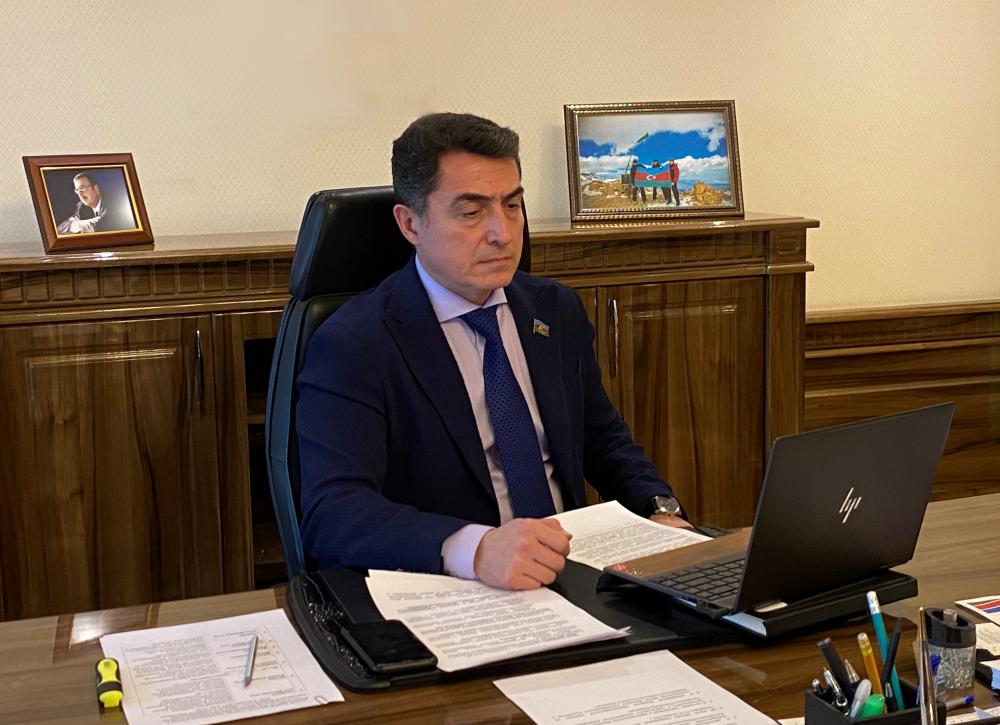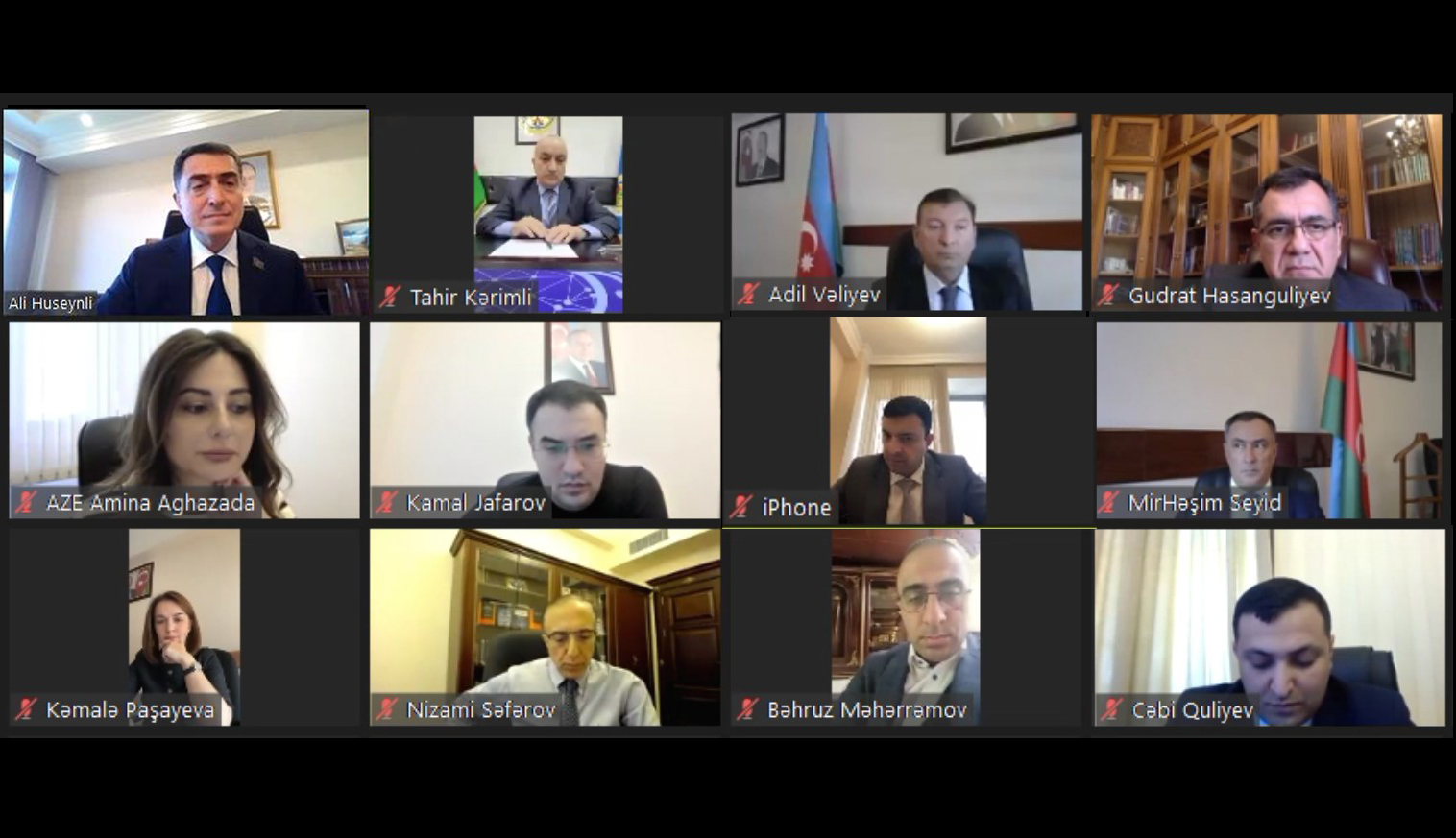At the Meeting of the Law Policy and State-Building Committee

The Milli Majlis Committee of Law Policy and State-Building held a meeting on 1 November which the committee head and First Deputy Chair of the Milli Majlis Ali Huseynli opened by introducing its agenda.
The agenda consisted of 26 items with the initial 4 ones being Bills in the first reading, Mr Huseynli announced. The list was topped with a draft law containing amendments to the Labour, Family and Criminal codes as well as the Code of Criminal Procedure and to the laws ‘On the Rights of the Child’, ‘On Barristers and the Bar Practice’, ‘On Education’, ‘On the Social Service’, ‘On the State Dactyloscopic and Genomic Registration in the Republic of Azerbaijan’ and ‘On the General Education’.
It was a committee member Amina Agazade who introduced those to the participants of the meeting, saying that the documents had been drawn up due to the enforcement of the law dated 22 October 2019 on ratification of the Council of Europe Convention on the Protection of Children against Sexual Exploitation and Sexual Abuse. The amendments to the codices and laws mentioned above are intended to prevent sexual exploitation and abuse of children of all kinds and forms therefore. Also, they are composed in order that there is a necessary legislative framework for aiding the victims. In particular, the amendments to the Criminal Code provide for the incorporation in national legislation of substantive criminal law provisions derived from the CE convention.
Mrs Agazade went on to say that it was proposed to improve the corpus delicti of certain crimes against sexual integrity and personal freedom. It is also planned to make more severe the penalties for such criminal acts when committed against minors.
The overview of the other Bills came from the committee chairman Ali Huseynli himself. He said, with regards to the draft amendments to the laws ‘On Banks’, ‘On the Post’ and ‘On Personal Data’ as well as to the Code of Administrative Offences, that they were to regulate matters related to the building of a unified information system on currency transactions and to cases of violation of the rules for submitting information on currency transactions for the system input.
Further, the draft amendments to the Code of Administrative Offences are there to institute the legal basis for the requirements concerning the use of telecommunications, radio frequencies and radio-electronic devices.
Next came up the amendments (in the first reading just like all the previous ones) to the Migration Code, drawn up in connexion with regulation of labour migration to the de-occupied territories of the country.
Ali Huseynli proceeded to make the committee aware of a Constitutional Bill containing second-reading amendments to the equally constitutional law ‘On the Human Rights Commissioner (Ombudsman) of the Republic of Azerbaijan’. He justified the need for the changes and revealed the attitude of the legislation subject itself to the points that MPs had been raising during the first reading.
It was said then that the second-reading amendments to the Migration Authorities Service Statute had been prepared to strengthen the social protection of the migration personnel, improve their material provisions and introduce a single remuneration system.
The meeting moved on to the next agenda item, namely, the third-reading amendments to the Criminal Code and the Code of Criminal Procedure, composed for the execution of the pertaining paragraphs of the Council of Europe Convention on Laundering, Search, Seizure and Confiscation of the Proceeds from Crime and on the Financing of Terrorism.
It was said after that that the third-reading amendments to the Law ‘On the State Registration of Legal Entities and the State Register’ envisaged making the anti-monopoly operation body one of those with access to information on founders of commercial legal entities and their stakes in share capitals.
The set of amendments to the Civil Service Law, intended to streamline the state administration, was looked at in the third reading, too.
According to Mr Huseynli, the remaining agenda items, that is, from the 11th to the 26th, are the substantively akin Bills in the second reading.
Those were the amendments to the following:
- The laws ‘On the Identification Card of the Citizen of the Republic of Azerbaijan’, ‘On the Passport’, ‘On the Registration at the Place of Residence and Abode’, ‘On the Status of the Member of the Milli Majlis of the Republic of Azerbaijan’, ‘On Traffic’, ‘On the Compulsory State Insurance of Employees of Courts of Law and the Law Enforcement Authorities’, ‘On the State Registration of Legal Entities and the State Register’, ‘On the Administrative Execution’ and ‘On the State Population Register of the Republic of Azerbaijan’;
- The Housing, Urban Planning and Construction, and Migration Codes;
- The Regulation on the Special documents for the Apatrides Permanently Residing in the Republic of Azerbaijan’, affirmed with the law No 421-IQ dated 30 December 1997;
- The Regulation on the Application of the Law of the Republic of Azerbaijan ‘On the Registration at the Place of Residence and Abode’;
- The Statute on Serving in the Internal Affairs Bodies of the Republic of Azerbaijan; and
- The Regulations on the Issue of the Return Certificates of the Republic of Azerbaijan.
The purpose of the amendments is to ensure that documents and information required for the provision of public services can be obtained from a relevant public authority through the government's electronic information system without having to send requests to citizens – if such documents and information are available from another public authority, that is.
Deliberations followed with the deputy committee chairman Gudrat Hasanguliyev and the member-MPs Tahir Karimli and Nizami Safarov offering their considerations, responses to the drafts and appropriate proposals.
The committee recommended ultimately that all the documents tabled during its meeting today should be brought up at a plenum of the Milli Majlis.
The MPs Bahrouz Maharramov, Sabir Hajiyev, Nurlan Hasanov, Azay Guliyev, Jabi Guliyev and Kamal Jafarov, amongst others, took part in the online meeting as well.
The Press and Public Relations Department
The Milli Majlis




